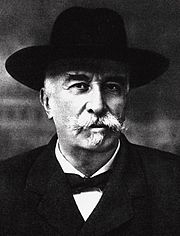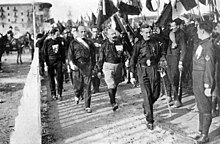Giovanni Giolitti
[3][4] A liberal[3] with strong ethical concerns,[5] Giolitti's periods in office were notable for the passage of a wide range of progressive social reforms, together with the enactment of several policies of government intervention.
[8] The primary focus of Giolittian politics was to rule from the centre with slight and well-controlled fluctuations between conservatism and progressivism, trying to preserve the institutions and the existing social order.
His mother taught him to read and write; his education in the gymnasium San Francesco da Paola of Turin was marked by poor discipline and little commitment to study.
[14] His uncle was a member of the Parliament of the Kingdom of Sardinia and a close friend of Michelangelo Castelli, the secretary of Camillo Benso di Cavour; however, Giolitti did not appear particularly interested in the Risorgimento and differently to many of his fellow students, he did not enlist to fight in the Italian Second War of Independence.
[17][18] Following Depretis's death on 29 July 1887 Francesco Crispi, a notable politician and patriot, became the leader of the Left group and was also appointed prime minister by King Umberto I.
After the fall of the government led by the new prime minister Antonio Starabba di Rudinì in May 1892, Giolitti, with the help of a court clique, received from the King the task of forming a new cabinet.
[17] Another main problem that Giolitti had to face during his first term as prime minister was the Fasci Siciliani, a popular movement of democratic and socialist inspiration, which arose in Sicily in the years between 1889 and 1894.
Consisting of a jumble of traditionalist sentiment, religiosity, and socialist consciousness, the movement reached its apex in the summer of 1893, when new conditions were presented to the landowners and mine owners of Sicily concerning the renewal of sharecropping and rental contracts.
In the three weeks of uncertainty before Crispi formed a government on 15 December 1893, the rapid spread of violence drove many local authorities to defy Giolitti's ban on the use of firearms.
[17] Despite the heavy pressure from the King, the army and conservative circles in Rome, Giolitti neither treated strikes – which were not illegal – as a crime, nor dissolved the Fasci, nor authorised the use of firearms against popular demonstrations.
[17] Thus he gained their favour, and on the fall of the cabinet led by General Luigi Pelloux in 1900, he made his comeback after eight years, openly opposing the authoritarian new public safety laws.
[40] A modification of the laws concerning hospitals and similar institutions, designed to provide (as Giolitti noted) “for an effective trusteeship over the funds of these bodies,” was carried out, while public health legislation was updated.
The conversion of the annuity was conducted with considerable caution and technical expertise: the government, in fact, before undertaking it, requested and obtained the guarantee of numerous banking institutions.
The criticism that the government received from conservatives proved unfounded: public opinion followed almost fondly the events relating, as the conversion immediately took on the symbolic value of a real and lasting fiscal consolidation and a stable national unification.
The strong economic performance and the careful budget management led to currency stability; this was also caused by a mass emigration and especially on remittances that Italian migrants sent to their relatives back home.
"[50] Various laws related to agriculture were also introduced,[51][52] public works for the South were initiated, the tax on heating oil used by the poor was cut,[53] and sickness and old age insurance was extended and improved.
[55] News of the disaster was carried to Prime Minister Giolitti by Italian torpedo boats to Nicotera, where the telegraph lines were still working, but that was not accomplished until midnight at the end of the day.
The vigorous attacks of the conservative opposition, led by Baron Sidney Sonnino, induced Giolitti to adjourn the debate until the autumn, when, the Cabinet having been defeated on a point of procedure, he resigned on 2 December.
Universal male suffrage, contrary to Giolitti's opinions, would destabilize the entire political establishment: the "mass parties," i.e. Socialist, Popular and later Fascist, were the ones who benefitted from the new electoral system.
[59] Although a man of first-class financial ability, great honesty and wide culture, Luzzatti had not the strength of character necessary to lead a government: he showed lack of energy in dealing with opposition and tried to avoid all measures likely to make him unpopular.
The claims of Italy over Libya dated back to Turkey's defeat by Russia in the war of 1877–1878 and subsequent discussions after the Congress of Berlin in 1878, in which France and Great Britain had agreed to the occupation of Tunisia and Cyprus respectively, both parts of the then declining Ottoman Empire.
In 1902, Italy and France had signed a secret treaty which accorded freedom of intervention in Tripolitania and Morocco;[66] however, the Italian government did little to realize the opportunity and knowledge of Libyan territory and resources remained scarce in the following years.
[71] The Vatican had two major goals at this point: to stem the rise of Socialism and to monitor the grassroots Catholic organizations (co-ops, peasant leagues, credit unions, etc.).
The agitations also extended to the agricultural areas of the Padan plain and were accompanied by peasant strikes, rural unrests and guerrilla conflicts between left-wing and right-wing militias.
He succeeded in forming a cabinet which comprised a number of non-Giolittians of all parties, but only a few of his own old guard, so that he won the support of a considerable part of the parliament, although the Socialists and the Popolari (Catholics) rendered his hold somewhat precarious.
[58] To the complaints of Giovanni Agnelli, who intentionally described a dramatic and exaggerated situation of FIAT, which was occupied by workers, Giolitti replied: "Very well, I will give orders to the artillery to bomb it".
He shared the widespread hope that the fascists would become a more moderate and responsible party upon taking power, but withdrew his support in 1924, voting against the law that restricted press freedom.
Critics from the political left called him ministro della malavita ("Minister of the Underworld"), a term coined by the historian Gaetano Salvemini, accusing him of winning elections with the support of criminals.
Rather than reform the state as a concession to populism, he sought to accommodate the emancipatory groups, first in his pursuit of coalitions with socialist and Catholic movements, and at the end of his political life in a failed courtship with Italian Fascism.
[17] Giolitti's prominent role in the years from the start of the 20th century until 1914 is known as the Giolittian Era, in which Italy experienced an industrial expansion, the rise of organised labour and the emergence of an active Catholic political movement.

















